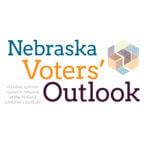 The Nebraska Voters’ Outlook is a statewide public opinion research initiative measuring Nebraskans’ thoughts on a cross-section of state policy and issues impacting children and families in Nebraska. The poll of 900 Nebraskans is conducted by the independent polling firm Patinkin Research Strategies, between March 19-March 25, 2020. Full results are available here. View the research memo here. Press release available here.
The Nebraska Voters’ Outlook is a statewide public opinion research initiative measuring Nebraskans’ thoughts on a cross-section of state policy and issues impacting children and families in Nebraska. The poll of 900 Nebraskans is conducted by the independent polling firm Patinkin Research Strategies, between March 19-March 25, 2020. Full results are available here. View the research memo here. Press release available here.
Amidst a public health, economic crisis, Nebraskans largely believe (64%) the state is heading in the right direction, a 6 point increase since July 2019 polling. Aside from education quality (+24 positive margin), Nebraskans believe the state legislature is under-performing on all other public policy priorities.
Nebraskans prioritize healthcare amid pandemic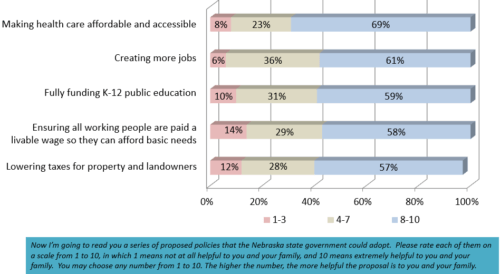
“Perhaps now more than ever, Nebraskans understand how important healthcare is to their lives, and the lives of others,” said Hadley Richters, CEO of Holland Children’s Institute.
A 69 percent majority prioritized access to affordable healthcare, ranking number one in terms of issue priority. Nebraskans in late March gave the state failing grades on its ability to provide paid sick leave (62% negative) and paid family leave (61%). Other questioning in the survey corroborates these findings. A majority (56%) express support the establishment of a paid family and medical leave program for every worker in Nebraska by increasing taxes on the
wealthiest four percent of Nebraskans. Around four-in-10 (42%) are opposed.
Concern over Governor’s delay of Medicaid expansion
“But, with the state approaching historically high unemployment, the Governor’s added work requirements and regulations to Nebraska’s Medicaid expansion policy further restricts Nebraskans from receiving the care and coverage they would otherwise qualify for under the expansion approved by Nebraska voters nearly two years ago,” explained Richters.
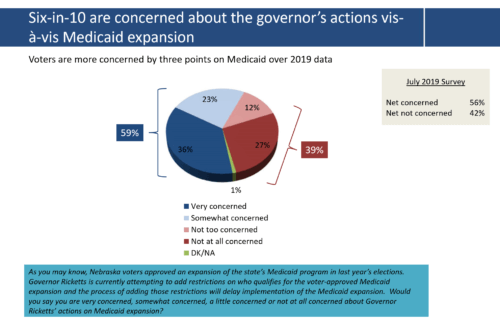 “The research reveals Governor Ricketts’ regulatory policies and further restrictions to healthcare access in Nebraska are severely out of touch, and out of sync with Nebraska families and their top priorities,” said Richters.
“The research reveals Governor Ricketts’ regulatory policies and further restrictions to healthcare access in Nebraska are severely out of touch, and out of sync with Nebraska families and their top priorities,” said Richters.
Asked what concerns them most, one-in-five (22 percent) say that the Governor is unfairly limiting access to the kids and seniors most in need. Another 14 percent say that they disapprove of his refusal to follow the will of the people, while 8 percent say that the delay in implementation itself is concerning.
Nebraskans want both quantity and quality jobs, with livable wages, benefits
Survey results also showed nearly six-in-ten voters (58 percent) support increasing state investment in early childhood 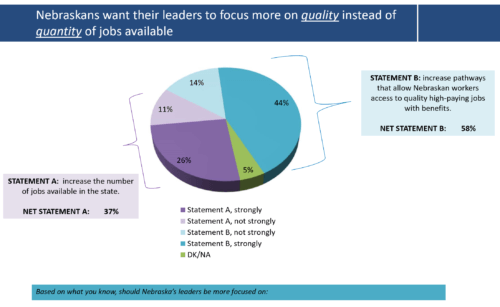 development.
development.
While healthcare was top of mind, Nebraskans also had strong thoughts on jobs, both quantity and quality. While 61 percent prioritized “creating more jobs” in mid to late March, a similar number (58 percent) thought state government must ensure “all working people are paid a livable wage so they can afford basic needs.”
When Nebraskans were specifically asked to choose between quantity over quality, nearly six-in-10 (58 percent) favored “increasing pathways that allow Nebraskan workers access to quality high paying jobs with benefits” (quality), with under four-in-10 (38 percent) in favor of “increasing the number of jobs available in the state” (quantity). As the pandemic subsides, it will be important to continue to heed the call for high quality job creation that focuses on building a job market that provides Nebraskans with a middle-class salary, and benefits.
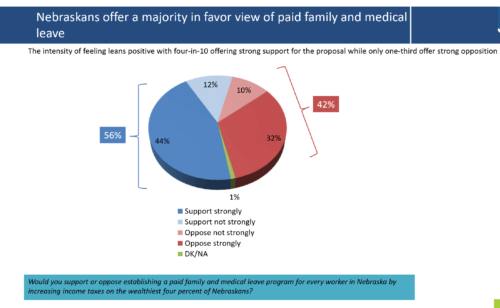
Paid family and sick leave remain popular
The state earns failing grades on its ability to provide paid sick (62 percent negative) and family leave (61 percent negative) at the onset of directed health measures. It should come as no surprise that a strong majority (56 percent) express support for the establishment of a paid family and medical leave program for every worker in Nebraska “by increasing taxes on the wealthiest four percent of Nebraskans.” Around four-in-10 (42 percent) are opposed to such a program.